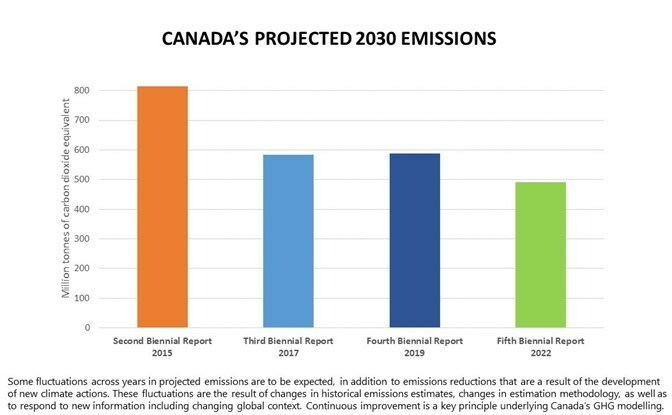
Canada’s climate action progress report has been submitted to the United Nations
by CM staff

The report shows the progress Canada is making towards climate action goals.

Some fluctuations across years in projected emissions are to be expected, in addition to emissions reductions that are a result of the development of new climate actions. These fluctuations are the result of changes in historical emissions estimates, changes in estimation methodology, as well as to respond to new information including changing global context. Continuous improvement is a key principle underlying Canada’s GHG modelling. (CNW Group/Environment and Climate Change Canada)
OTTAWA — Environment and Climate Change Canada submitted Canada’s Eighth National Communication and Fifth Biennial Report on December 31, 2022 by Minister Guilbeault. The report was postponed for an extra year by the UNFCCC.
“The report shows the real progress that Canada is making, thanks to our accelerated climate action in recent years, fighting climate change while also building a strong economy,” said Minister Guilbeault. “Since the last Biennial Report to the UNFCCC in December 2019, Canada has faced the public health and economic challenges resulting from COVID-19, as well as a global energy crisis resulting from Russia’s unjustified and illegal invasion of Ukraine that has changed the emissions and energy outlook of all nations.”
“In this context, Canada’s resolve to fight climate change and move toward a clean energy future has only grown stronger. Although events like the global energy crisis affect Canada’s modelling for this year, this report shows that Canada’s commitment to reduce emissions by 40 percent by 2030 remain not only within reach, but realistic. With the addition of measures that are not currently modelled in this report—including the cap on emissions from the oil and gas sector, and further climate programs—Canada is well positioned to reach our emissions reductions goals. This is the time to double down on climate action—to build a strong economy, create jobs, and ensure a bright future for generations to come.
“The 2019 Biennial Report projected that Canada would reduce emissions by 227 million tonnes from the 2015 Biennial Report. I am happy to state that the 2022 report shows that Canada is on track to reduce another 97 million tonnes by 2030, in addition to the 227 million tonne reduction projected from the 2015 report. This is another 16 percent drop from the 2019 projections. This is the result of the measures we announced since the last Biennial Report, and highlights the major strides we have made toward our greenhouse gas-reduction targets. They also reflect Canada’s strengthened position as a reliable and trusted global energy and clean technology supplier.
“Canada has been focused and relentless in pursuing climate action since 2015. A series of major environmental policy plans—starting with the Pan-Canadian Framework in 2016—began to correct the alarming upward trajectory of Canada’s emissions profile. Since the 2019 Biennial Report to the UNFCCC, Canada published a strengthened climate plan, A Healthy Environment and a Healthy Economy, in December 2020, which included 64 strengthened and new federal policies, programs, and investments to cut pollution and build a stronger, cleaner, more resilient and inclusive economy. We adopted the Canadian Net-Zero Emissions Accountability Act in June 2021, enshrining in law Canada’s enhanced new target to reduce emissions 40–45 percent below 2005 levels by 2030. We have also implemented and strengthened a national pollution pricing system in Canada, that is not only one of the most effective ways to fight climate change but also makes life more affordable for Canadian families. Canada also became the first country to commit to reducing methane emissions in the oil and gas sector by at least 75 percent below 2012 levels by 2030.”
“In March 2022, Canada released its 2030 Emissions Reduction Plan: Canada’s Next Steps for Clean Air and a Strong Economy, the most comprehensive emissions reduction plan in Canada’s history. This plan includes $9.1 billion in new investments, and reflects economy-wide measures such as pollution pricing and clean fuels, while also targeting actions ranging from buildings to vehicles and industry. In December 2022, we published draft regulations for a regulated zero-emission vehicle sales target, the first regulations to come out of the Emissions Reduction Plan.”
“More measures are coming in 2023, including taking steps to become the first major oil and gas producer to put in place a cap on oil and gas sector emissions—a significant measure that is not yet included in Canada’s 2030 UNFCCC emissions modelling.”
“A cleaner, healthier, more efficient, and affordable net-zero future for Canada is within our reach. Canada will continue to work with provinces and territories, municipalities, Indigenous peoples, the financial community, innovators, and businesses, as well as the international community, to ensure that it is on good footing to achieve all of the many benefits that come with its 2030 target, and firmly on the path to net zero by 2050.”